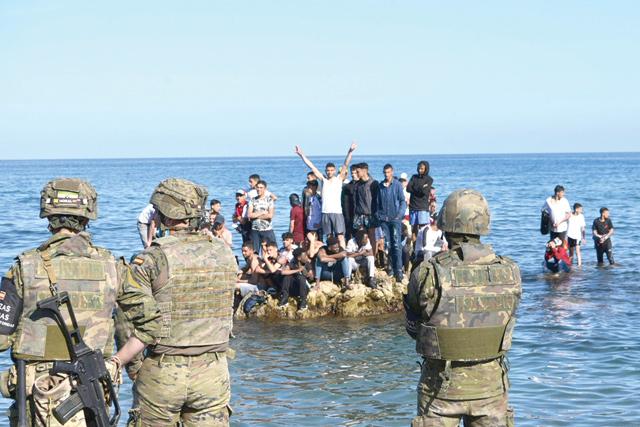You are here
Migrants mass at Spain-Morocco border as Europe says 'will not be intimidated'
By AFP - May 20,2021 - Last updated at May 20,2021

Spanish soldiers stand guard as migrants stand on rocks off the shore of the Spanish enclave of Ceuta, on Tuesday (AFP photo)
CEUTA, Spain — A steady stream of migrants tried to swim to the Spanish enclave of Ceuta on Wednesday, after a record influx of arrivals sent diplomatic tensions soaring between Madrid and Rabat.
A European commissioner vowed that the continent would not be "intimidated" after some 8,000 migrants rushed into Ceuta since Monday.
Spanish Prime Minister Pedro Sanchez vowed to "restore order" after the unprecedented surge, and said on Wednesday that some 4,800 migrants had been sent back.
The influx comes against the backdrop of soaring tensions with Morocco over Spain's decision to provide medical treatment for the leader of the Western Sahara independence movement, Polisario Front, who has been seriously ill with COVID-19.
It has revived the thorny issue of migration into the EU, with the Vice President of the European Commission, Margaritis Schinas, saying Wednesday the continent "will not be intimidated by anyone".
Speaking on Spanish radio, he said there have been "a few attempts by third countries... over the past 15 months" to leverage the migrant issue.
In a veiled reference to Rabat, Schinas said on Spanish radio that Europe would "not be a victim of these tactics".
"Ceuta is Europe, this border is a European border and what happens there is not a problem for Madrid, but a problem for all Europeans," he said.
'Viva Espana'
On the ground, people continued to gather on the Moroccan border with Spain on Wednesday.
As the sun rose, a handful of people were swimming to reach the Spanish side, their slow progress carefully watched by dozens of soldiers deployed along the beach with riot shields and batons, according to an AFP correspondent on the scene.
It was not clear how many managed to cross, but those who made it to shore were immediately picked up by soldiers and escorted to where medics were offering help, although few appeared to need it.
They were then frogmarched back to the border fence where they were sent home.
Although the distance between African territory and Europe technically involves a swim of barely 200 metres, many tried to push beyond the nearest beach to avoid the waiting troops.
"Viva Espana" yelled one repeatedly, before starting to call for help in increasingly panicked tones to a nearby rescue boat.
Through the border fence, large crowds of hundreds of people were massed on the neighbouring Moroccan beach.
Desperate for a better life, many migrants who were returned to Morocco said they would try to cross over again.
“I love my country but I can’t live without an income,” 17-year-old Moroccan named Osama told AFP shortly after he was returned from Ceuta. “I am not afraid to return there.”
Analysts said it was clear Morocco had turned a blind eye to the human tide surging into Ceuta to put diplomatic pressure on Spain to recognise its sovereignty over Western Sahara.
Most of the migrants had crossed into Ceuta largely unimpeded by Moroccan security forces on Monday, but by Tuesday morning, Rabat had deployed reinforcements at the Fnideq border crossing.
Overnight Wednesday, police on the Moroccan side of the border blocked dozens of youths from crossing over, who responded by throwing rocks.
The migrants reached Ceuta by swimming or by walking at low tide from Moroccan beaches a few kilometres to the south, some using inflatable swimming rings and rubber dinghies.
One man drowned en route, Spanish officials said.
The crisis comes after Madrid allowed Polisario Front leader Brahim Ghali to fly to northern Spain in mid-April to be treated for COVID-19, angering Rabat.
The Polisario Front has fought for the independence of Western Sahara, a former Spanish colony that is mainly under Moroccan control.
Morocco’s minister of state for human rights, Mustapha Ramid, said Wednesday that it was “clear” that Spain had favoured its ties with the Polisario and Algeria over those with Morocco by hosting Ghali.
“Spain must also know that the price for discrediting Morocco is steep,” he added in a Facebook post.
The Moroccan authorities have long wanted Spain to acknowledge their authority over Western Sahara, as Washington did in December under former president Donald Trump, and were using the Ghali spat to put pressure on Madrid.
Spain has long maintained that a solution to the issue can only come from an agreement brokered by the United Nations.
During a radio interview on Wednesday, Spanish Foreign Minister Arancha Gonzalez Laya said Madrid “could not” change its position because Spain ‘respects international law”.
Related Articles
RABAT — Morocco on Friday rejected a resolution by the European Parliament which accused Rabat of using migrants to apply "political pressur
RABAT — Morocco’s prime minister has said that US-led multination African military exercises this month would take place in the disputed des
RABAT — King Mohammed VI wants to “settle definitively” the situation of Moroccan minors who have made the illicit journey to Europe, the No











